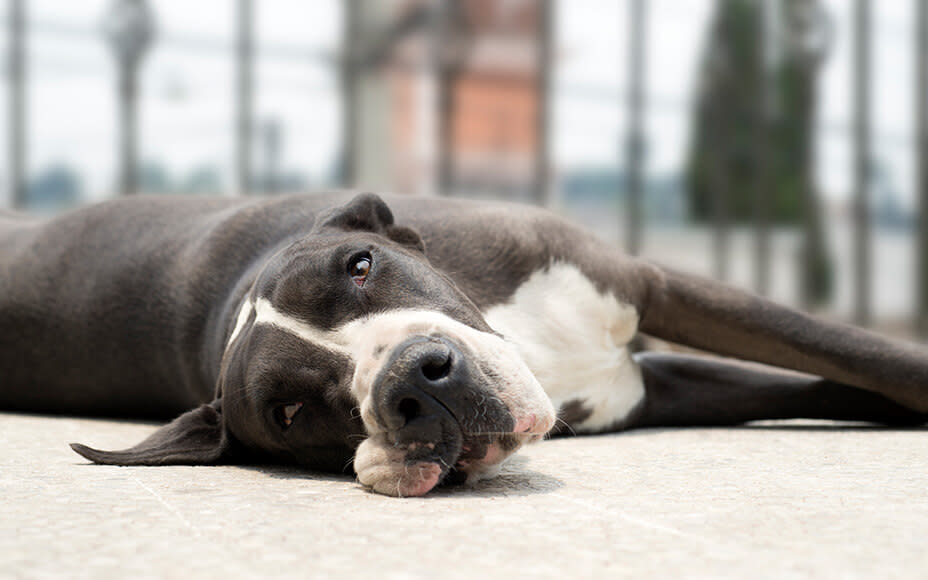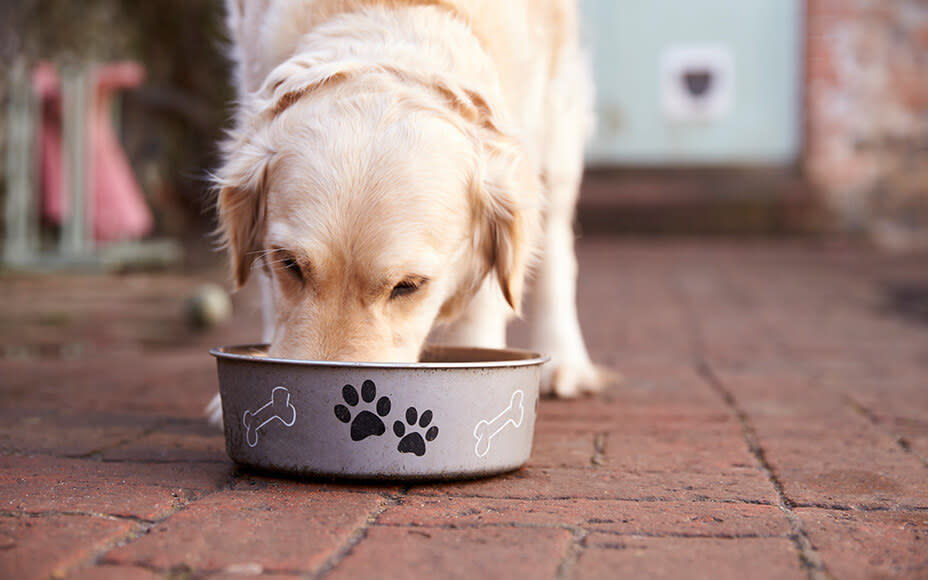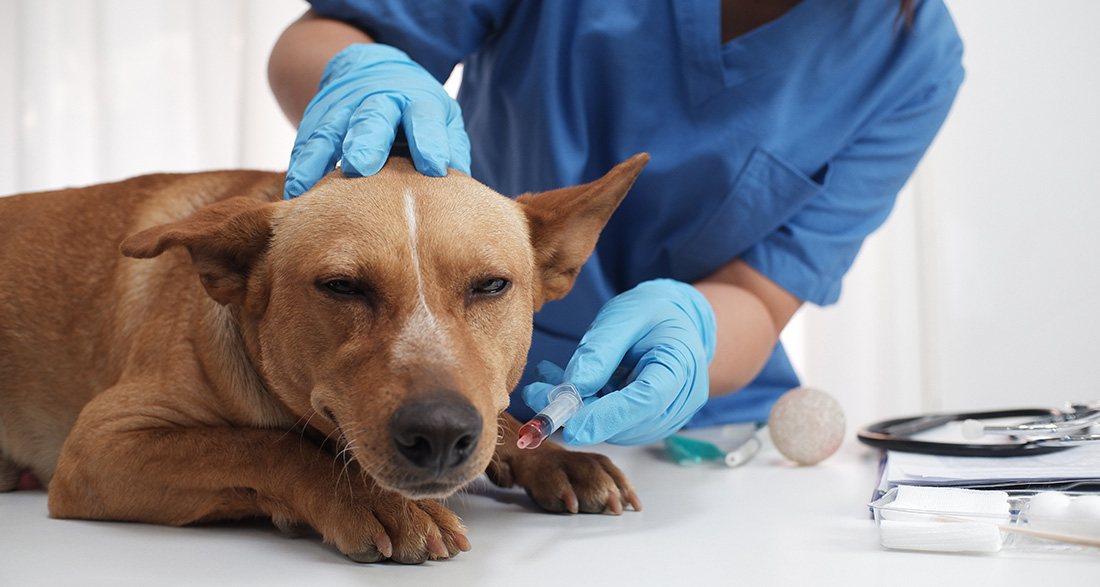(Chronic) kidney insufficiency in dogs is often recognized only in the late stages. Learn to interpret the symptoms in time and discover how you can assist your dog.
- Kidney Insufficiency in Dogs
- Causes: What Causes Kidney Insufficiency in Dogs?
- Symptoms and Treatment of Acute Kidney Insufficiency in Dogs
- Diagnosis and Treatment of Acute Kidney Insufficiency
- Symptoms and Treatment of Chronic Kidney Insufficiency in Dogs
- Diagnosis and Treatment of Chronic Kidney Insufficiency
- The Right Nutrition for Kidney Insufficiency
Kidney Insufficiency in Dogs
In addition to the liver, the kidneys are among the body’s essential detoxification organs. When they no longer function properly, waste products from metabolism and toxins are not completely eliminated, accumulating in the body. Kidney insufficiency in dogs is a serious condition that can affect both young and older dogs. Furthermore, there are dog breeds with a genetic predisposition (e.g., Bernese Mountain Dog) that may be more prone to kidney insufficiency.
Prevention is key: regular check-ups with your veterinarian can help detect and treat the disease early. By providing a healthy and balanced diet with high-quality food, you pave the way for a happy and long life for your four-legged friend. And healthy doesn’t have to be complicated: whether it’s dry food, wet food, or BARF (Biologically Appropriate Raw Food) – our iHugDogs food is packed with high-quality meat, vegetables, and fruits, as well as essential vitamins, minerals, and oils. No sugar, grains, or artificial additives!
Causes: What Causes Kidney Insufficiency in Dogs?
The causes of kidney insufficiency are diverse, leading to damage to kidney tissue in various ways. Possible causes include:
- Kidney inflammation
- Obstruction of the urinary tract by stones or tumors
- Poisoning from toxic foods like grapes
- Kidney tumors
- Congenital diseases
- Secondary condition to an existing illness such as heart failure or diabetes

Symptoms and Treatment of Acute Kidney Insufficiency in Dogs
In acute kidney insufficiency, there is a sudden deterioration of kidney function. The degree of kidney impairment varies, and it can also be temporary. Mild kidney insufficiency, for example, affects kidney function, but the effects are not as significant as with complete kidney failure. Often, there is a retention of waste products (urea, creatinine, etc.) in the body because the kidneys’ filtering function is not working correctly. Consequently, this can lead to damage to other organs in the body.
Symptoms of acute kidney damage include:
- Vomiting
- Loss of appetite
- Apathy
- Seizures
- Little to no urination or suddenly increased urination
If your dog already has a chronic illness, is under a lot of stress, or has ingested something toxic, you should promptly visit an animal clinic upon the appearance of one or more of these symptoms. To prevent further damage and expedite your pet’s recovery, veterinarians will usually begin treatment directly.
Diagnosis and Treatment of Acute Kidney Insufficiency
In the veterinary clinic, a physical examination, as well as blood and urine analyses, are conducted to diagnose acute kidney insufficiency. These tests reveal typical changes in the blood and possible clues to the cause of kidney damage. Additionally, X-rays and ultrasound examinations are often performed to assess the current condition of the kidneys and identify potential triggers for kidney damage.
Ideally, these examinations uncover the primary cause of acute kidney insufficiency, allowing for precise treatment of your beloved pet. If it is a bacterial infection, it will be treated with an appropriate kidney-friendly antibiotic. If urinary stones obstruct the urinary tract, they must be surgically removed once your pet’s condition stabilizes. Simultaneously, the elimination of toxins is accelerated, and, if necessary, the concentration of toxins in the body is diluted.
The good news is that when acute kidney insufficiency is identified and treated promptly, it can completely heal. With a temporarily adjusted diet through the feeding of a special kidney-friendly food, you can further support your pet’s recovery.
Symptoms and Treatment of Chronic Kidney Insufficiency in Dogs
When kidney damage occurs and remains undetected or untreated, the primary functions of the affected kidney(s) deteriorate progressively, leading to long-term complications and limitations in other organs and systems in your dog’s body.
Common consequences of chronic kidney insufficiency in dogs include:
- Retaining uremic, toxic substances in the body due to reduced kidney filtering function. Instead, urea is excreted through the stomach and oral mucous membranes, causing a urine-like odor and gastric mucosal inflammations.
- Restriction of the hormonal activity of the kidney, which, in turn, reduces the production of red blood cells and may lead to anemia.
- Increased urine output washes nutrients out of the body, potentially causing nutrient deficiencies.
- Overproduction of blood pressure-regulating hormones, leading to kidney-related hypertension (renal hypertension).
- Reduced processing of precursor forms of Vitamin D, resulting in Vitamin D deficiency.
Symptoms of chronic kidney insufficiency:
Chronic kidney insufficiency often goes unnoticed for a long time since externally visible symptoms usually appear very late or only in exceptional situations, such as when your dog is highly stressed or exerted. Depending on the progress of the disease, various symptoms may occur with varying intensity:
- Increased drinking
- Increased urination
- Sudden, nighttime incontinence
- Nausea, vomiting
- Loss of appetite
- Fatigue
- Pale mucous membranes (e.g., in the mouth)
- Dull coat
- Bad breath, changes in the gums
- In advanced stages, trembling, epileptic seizures
If left untreated, chronic kidney insufficiency can become life-threatening. If you observe behavioral abnormalities in your beloved pet, it’s advisable to have them checked by veterinarians. With timely initiation of treatment, dogs with chronic kidney insufficiency can still lead good and long lives.

Diagnosis and Treatment of Chronic Kidney Insufficiency
In practice, the treating veterinarians will closely examine your four-legged friend. In addition to a physical examination, a comprehensive blood test and urine analysis will be conducted. If necessary, X-rays or ultrasounds may be required to obtain a current image of the kidneys, other organs, and bone structures, providing insights into potential causes. This process also helps rule out that it is not “just” an acute kidney insufficiency.
As the disease often remains undetected for so long, your dog needs to be stabilized first. This may involve infusions for electrolyte balance and toxin removal, as well as the administration of medications to alleviate symptoms such as vomiting and pain.
Since chronic kidney insufficiency cannot be cured, and the damaged kidney tissue unfortunately cannot be “repaired,” therapy aims to counteract the progression of the disease and ensure your pet the best possible quality of life.
Three essential components are part of the therapy:
- Constant access to fresh water and adequate fluid intake (even with incontinence).
- Regular intake of kidney-friendly medications and routine check-ups by veterinarians.
- A special kidney diet with highly digestible protein from high-quality sources and low phosphate content.

The Right Nutrition for Kidney Insufficiency
If your dog suffers from chronic kidney disease, transitioning to a special kidney diet, such as providing our “Vet” Liver & Kidney Fit, can alleviate the burden on already damaged kidneys, significantly supporting your pet’s well-being. Even if you want to help your pet as quickly as possible, be mindful of a gradual transition to the new special kidney diet.
Some pets may experience nausea and loss of appetite due to the chronic illness. To make the food more palatable, you can warm it up and offer smaller portions several times a day. Some dogs also prefer home-cooked food. After consulting with nutrition experts, you can get back in the kitchen and stimulate your sick pet’s appetite.
Furthermore, ensure an adequate fluid intake and regularly perform check-ups with veterinarians.
What Is the Life Expectancy of a Dog with Chronic Kidney Insufficiency?
The good news is that even though the disease is incurable, with individualized treatment and adapted nutrition, your dog can lead a long and beautiful life. Acute relapses are unfortunately always possible, but the earlier they are detected and treated, and the overall therapy is consistently followed, the more comfortable your beloved pet’s life will be.


